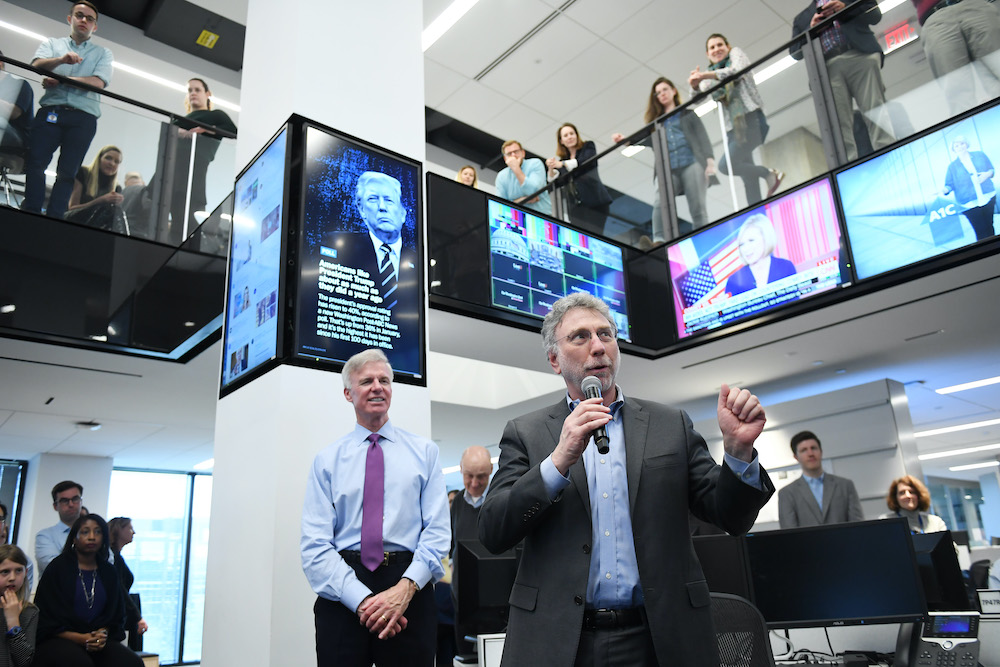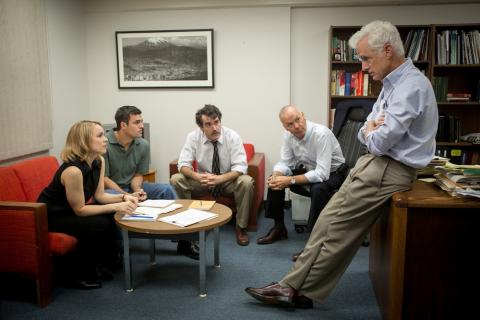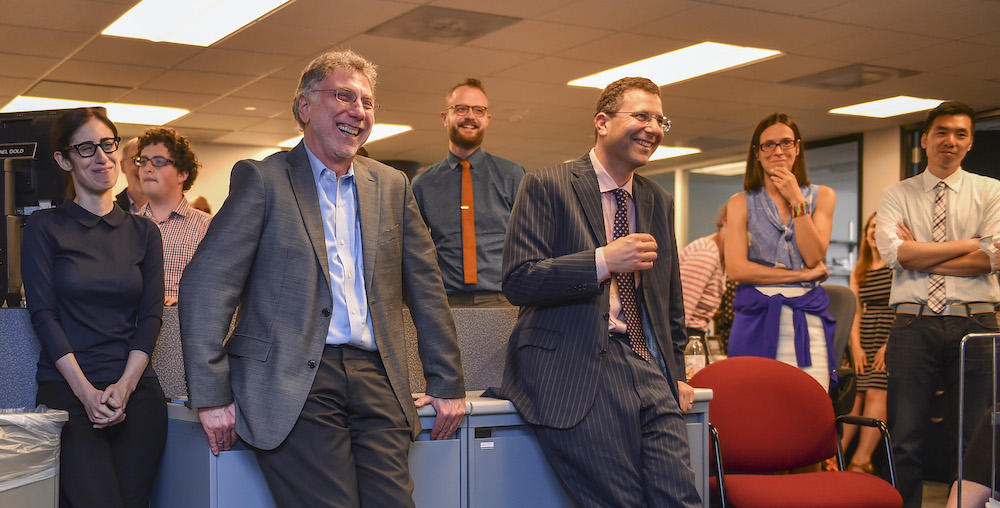
Executive Editor Martin Baron, holding microphone, speaks to staff at The Washington Post in this undated photo. (Courtesy of The Washington Post)
When Martin Baron, one of the most consequential newspaper editors in America, announced his upcoming retirement, he cited his work overseeing the Boston Globe's coverage of clergy sexual abuse and cover-up as a highlight of his journalistic career.
"I think the impact has been really quite profound on several levels," he told NCR ahead of his retirement. "One on investigative journalism, the other on the Catholic Church and then more broadly on institutions that are facing allegations of abuse of various types, but particularly sexual abuse."
Baron, who will retire as executive editor of The Washington Post on Feb. 28 and who previously helmed the Globe and the Miami Herald, led news coverage of the Florida presidential ballot recount in 2000, the 9/11 terrorists attacks, the historic election of President Barack Obama, two impeachment proceedings against President Donald Trump and a global pandemic.
Yet it was his Spotlight team's pioneering work in 2001 and 2002, which earned the Globe a Pulitzer Prize in Public Service for chronicling decades of abuse in the Boston Archdiocese and subsequent cover-up by the most powerful Catholic cleric in the country, Cardinal Bernard Law, that would be turned into an Academy Award-winning film in 2015 in which Baron was memorably portrayed by Liev Schreiber.
While Baron may be a newspaperman's newspaperman, he doesn't mind the fact that it was a movie that increased his prominence beyond the newsroom, telling NCR it was gratifying to see the way "Spotlight" elevated the importance of journalism.
"A film reaches tens of millions of people around the world," said Baron, who praised the film for the way it demonstrated the significance of investigative reporting and how, if done well, it can confront power and hold it accountable.
Advertisement
"The rewards were a lot more important than the awards," he added.
While previous papers had reported on clergy abuse for nearly 15 years before the Globe's investigation, including NCR dating back to 1985, Baron believes it was the massive collection of internal church documents, including scores of cases against abusive priests settled out of court, which were eventually acquired by the paper, that finally forced the church to confront the issue.
Baron said the Globe's reporting demonstrated that the hierarchy of the church had betrayed the faithful, particularly single moms who had entrusted their kids to a male figure who often substituted as a father.
"They trusted that these kids would be well taken care of because it was a priest," he recalled. "And they were totally betrayed."
Baron's pursuit to get to the bottom of the clergy abuse cover-up in Boston began his first day on the job when he made the decision to take legal action to obtain court documents that the church had kept sealed for years.
Soon after his arrival in Boston, he had an introductory meeting with the cardinal, which is memorably portrayed in the "Spotlight" film.
"At the time it was pretty clear to me that he knew that we were conducting an investigation. But he didn't mention it, and I certainly wasn't going to mention it," Baron recalled, noting that Law spent a lot of time talking to him about Israel.
"It was clear to me that he had done a bit of research on me. He knew that I was Jewish," said Baron. Despite the awkwardness, Law was "quite gracious," he recalled, especially given that Baron had gotten lost en route and was an hour late.
As the meeting concluded, Law grabbed a copy of the Catechism of the Catholic Church and gave it to Baron as a parting gift. Baron said he tried to read it but never could get through it, and that the copy that's seen in the film was the very copy Law gave him.
Baron faced his share of criticism, including by some in the newsroom, for being an outsider unfamiliar with Boston's customs. Yet even prior to his arrival, in 1992, the paper had been targeted by Law who publicly called "down God's power on the media, particularly the Globe." To this day, Baron rejects the charge made by some that the paper's coverage of clergy abuse was driven by an anti-Catholic bias.
"I would say some of the most gratifying comments about our investigation in Boston have come from devout Catholics, including from priests," said Baron, adding that, beyond the gratitude from survivors, those comments are the ones he values most highly.
"I think we have to distinguish between an attack on the faith and holding the faith accountable for abiding by the principles of the faith," he added.
Twenty years later, the result of that reporting caused a reckoning within the church that has challenged three popes and thousands of clergy across the globe. Baron offers a mixed assessment of the effectiveness of the reform efforts that have followed since then.
"As the church tried to grapple with this and suggested it was reforming, it became clear that these reforms were implemented in some instances in name only, if not in reality," he said.
"The church is still dealing with this and still grappling with what it feels might be an appropriate response. And so I think that story is likely to continue. But, the impact, I think, is permanent."
Baron specifically pointed to Asia and Africa, which often lack a vigorous press and where cases of abuse go unreported, surmising "that's because the church is probably not feeling the same level of pressure."
Beyond the church, Baron says that there were a number of institutions "engaged in much of the same behavior" and for them to see the church forced to confront its own culture of abuse and cover up had a ripple effect.
He specifically cited the sex scandal involving Penn State's football team that surfaced in 2011, saying he feels "confident" that the university was "more forceful in addressing the allegations of sexual abuse because they saw what had happened in the Catholic Church."
As Baron looks to enjoy a change of pace, he leaves his editor's desk at a time when journalism is constantly under assault and the institutions once entrusted with ensuring the freedom of the press seem determined to undermine it. The announcement of Baron's departure came on Jan. 26, just days after a president left office who constantly lambasted the media and dubbed critical reporting of him as "fake news."
"It's a period of special difficulty for us, because a democracy, and the press within the democracy, requires a society that agrees to a common set of facts. The press has always been considered to be an arbiter of fact. We're not the only one. We're not a perfect one, but we're among them," said Baron.

Rachel McAdams, Mark Ruffalo, Brian d'Arcy James, Michael Keaton and John Slattery star in a scene from the movie "Spotlight," which chronicles the Boston Globe's uncovering of the clergy sex abuse scandal in the Archdiocese of Boston in 2002. (CNS/Open Road Films)
Looking ahead, Baron said the country must return to a time wherein it is capable of agreeing on a common set of facts. That task, he believes, does not fall solely on the press, but is a societal burden. While he doesn't have a comprehensive strategy, he offered three starting points: greater civic education so that people have a better understanding of how government works and how it's structured; a greater commitment to studying history and, especially, the Constitution; and an investment in media literacy.
"People need to be more analytical consumers of what comes across the internet or anywhere else. They need to be able to ask the right questions to determine whether these are credible sources or not credible sources. And people ultimately need to understand the difference between being informed and being affirmed," he said. "A lot of people want to be affirmed. They just want somebody to tell them that their pre-existing point of view is absolutely correct."
While Baron knows that such reforms won't happen overnight, he says the country must act with haste.
"If we don't start now, we'll never get there," he said.
On that front, he is, in theory, in agreement with the head of the very institution which his journalistic pursuits have forever altered. Pope Francis has been a harsh critic of the rise of "fake news" and has condemned the manipulation of facts for purposes of "sheer narcissism" and called journalists "essential."
Yet like all good journalists, Baron maintains a healthy degree of skepticism.
"The church says the right things. It doesn't necessarily do the right things all the time," he told NCR. "And it doesn't do them all quickly."
As Francis approaches the eight anniversary of his election as pope, Baron isn't ready to render a definitive verdict on what sort of grade he'd give the pontiff on his handling of clergy sex abuse.
"It's incomplete," says Baron. "The fact that 20 years later we're still talking about whether the church has done enough answers itself."

Oct. 22, 2020, video of the 2020 Markoe-DePorres Lecture from Creighton University featuring Bishop John Stowe and Cathleen Kaveny, professor of theology and law at Boston College: "Voting and Catholicism: A Critical Discussion of Forming Consciences for Faithful Citizenship"








